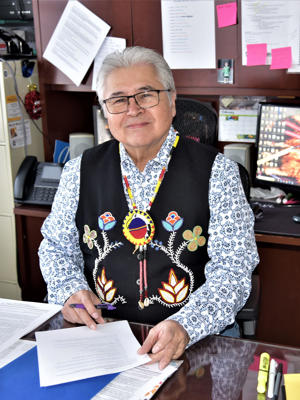
© Wisconsin Public Radio Robert Van Zile, Chairman of the Sokaogon Chippewa Community (Mole Lake)
MADISON – Sokaogon Chippewa Community Chairman Robert Van Zile delivered the 19th annual State of the Tribes Address at the Wisconsin State Capitol March 14 to legislators and tribal representatives.
Here are five takeaways from the address.
1. Give nurse practitioners more autonomy.
Many living in tribal communities or in rural areas lack access to adequate health care, Van Zile said in his address.
In his reservation in Forest County in northern Wisconsin, he said it’s a 45-minute drive to the nearest health facility for the 500 tribal members living there.
“As we all know, the cost of unhealthy people essentially functions as a tax on the state,” Van Zile said.
One way the state can address the situation is to pass a law that would enable nurse practitioners to run a health facility without the physical presence of a physician, he said.
Studies have shown that clinics run by nurse practitioners in rural communities greatly improve the health of residents, he added.
Indigenous physicians: Ho-Chunk woman Amy DeLong rose to be one of 3,400 Indigenous physicians in the US
He also tribes were promised free health care by the federal government in exchange for ceding millions of acres of land, but the Indian Health Service does not even cover half the cost to run a tribal health clinic for each tribe.
Since Medicaid for Wisconsin residents is funded jointly by the state and federal governments, Van Zile urged legislators to join tribal officials in making the case to the federal government that it has not upheld its promise to fund tribal health care.
2. Crack down on illegal gambling.

© Ebony Cox, Ebony Cox/USA TODAY NETWORK-Wisconsin FILE – Money is counted on a counter at Oneida Casino in Green Bay in March 2020 after a woman won playing a slot machine. The state made a compact with the tribes to run gambling operations, which are regulated and provide $60 million in revenue to the state every year. However, it’s estimated 60,000 illegal gaming machines are operated in taverns across the state, resulting in millions of dollars of uncollected taxes.
Van Zile urged legislators to crack down on illegal gambling in the state.
He said it’s estimated 60,000 illegal gaming machines are operated in taverns across the state, resulting in millions of dollars of uncollected taxes.
The state made a compact with the tribes to run gambling operations, which are regulated and provide $60 million in revenue to the state every year, Van Zile said.
He said the illegal gaming machines are not regulated and are ripe for corruption, such as cheating the consumer.
Diversifying tribal revenue: The pandemic drove home the Oneida Nation’s need to rely less heavily on casino revenue. Here’s how the tribe is adjusting.
3. Focus on protecting the environment.

© Mark Hoffman / Milwaukee Journal Sentinel A man rows a boat on the lower Menominee River in Marinette in August. The EPA is delisting the lower Menominee River after nearly 30 years of cleanup to remove contamination at risk of flowing into the Great Lakes.
“We continue to be presented with a false choice,” Van Zile said. “We do not need to choose between economic prosperity and breathing clean air.”
He urged legislators to protect the environment from industry.
Van Zile said many people love a Wisconsin Friday fish fry, but many fish are found with high levels of forever chemicals, such as mercury, and that we’re slowly poisoning ourselves.
Wisconsin’s degraded waterways: Wisconsin has four of the most degraded waterways in the Great Lakes basin. Here’s the status of these ‘areas of concern.’
He also urged the state to implement an environmental impact study on the Line 5 oil pipeline project by Enbridge in northern Wisconsin.
Van Zile pointed out that the company has had 29 oil spills polluting waterways and that most spills were not detected by Enbridge.
He said much of Wisconsin’s tourism economy depends on being able to enjoy natural resources.
“Ruin these natural resources and the people will take those dollars elsewhere,” Van Zile said.
Railing against the pipeline: Indigenous-led activists protest Wisconsin oil pipeline in Green Bay, around Wisconsin
4. Expand Act 31 and ban race-based mascots.

© Ebony Cox/USA TODAY NETWORK-Wisconsin Libby Carrington, 9, pays attention to the video the Clan Mother Healing the Community on Thursday, Nov. 21, 2019, at Bowler Elementary School in Bowler, Wis. School districts across Wisconsin handle their Act 31 curriculum requirements which requires that schools teach Native American and/or First Nations history. “It was the best! I liked how she was talking about her son and how he died, but it was really sad too,” Carrington said.
Van Zile said that while some school districts follow Act 31 closely by including tribal education in their curriculums, he said tribal officials believe the spirit of the act is not being followed overall in Wisconsin schools.
The act requires two lessons in elementary school and one lesson in high school about Native American heritage.
But Van Zile said one or two lessons is not enough to learn much about the tribes in Wisconsin.
Teaching Native American culture: Natasha Verhulst wasn’t taught Native American music in school. Now a teacher, she’s changing that.
He said the continued use of race-based Indigenous mascots and logos in some schools in Wisconsin is a “black cloud” on the education system.
Van Zile said a portion of tribal casino revenue should be made to remove the cost hurdle for school districts to change their race-based mascots and logos to create a more inclusive and less offensive environment for all children to learn.
Rallying against mascots: Wisconsin high school students, inspired by First Nations education, push to change Native American mascots
5. Allow tribal police a state pension.

© Evgen_Prozhyrko, Getty Images/iStockphoto Red and blue Lights of police car in night time. Night patrolling the city. Abstract blurry image.
Van Zile encouraged legislators to follow Gov. Tony Evers’ plan to create an office to address the epidemic of violence against Indigenous people.
He also said tribal communities lose good police officers because they take jobs with non-tribal police departments that offer a state pension.
Van Zile encouraged legislators to allow tribal police to participate in the state pension so tribes can better retain their officers.
Read more about Wisconsin’s Indigenous communities:
Frank Vaisvilas is a Report for America corps member who covers Native American issues in Wisconsin based at the Green Bay Press-Gazette. Contact him at [email protected] or 815-260-2262. Follow him on Twitter at @vaisvilas_frank.You can directly support his work with a tax-deductible donation online at GreenBayPressGazette.com/RFA or by check made out to The GroundTruth Project with subject line Report for America Green Bay Press Gazette Campaign. Address: The GroundTruth Project, Lockbox Services, 9450 SW Gemini Drive, PMB 46837, Beaverton, Oregon 97008-7105.
This article originally appeared on Green Bay Press-Gazette: Wisconsin’s 2023 State of the Tribes touches on mascots, health care, illegal gambling and more: 5 takeaways
